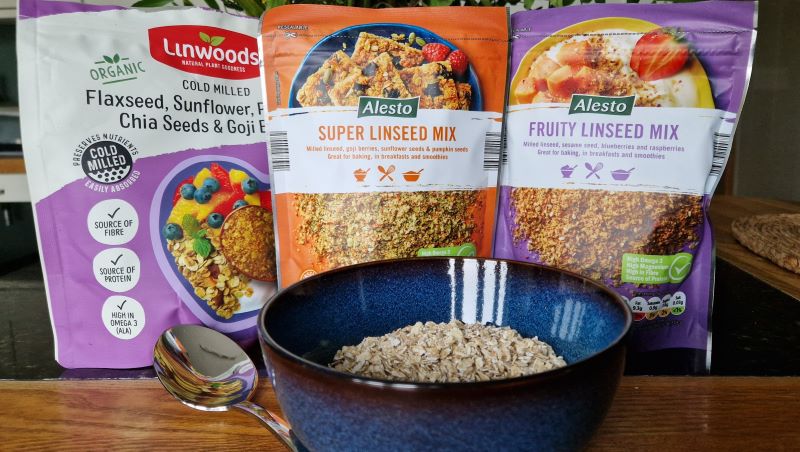Flaxseeds, also known as linseeds, are gaining popularity for their potential health benefits. Packed with fibre, omega-3 fatty acids and other nutrients, flaxseeds can help IBS symptoms, maintain a healthy gut and boost the immune system. You can add them to many meals, from smoothies and porridge, to cakes and biscuits. But for those struggling with irritable bowel syndrome (IBS), read on for some useful tips.
IBS and the fibre factor
IBS is a chronic condition affecting the large intestine, causing frequent abdominal pain, cramping, bloating, constipation or diarrhoea. While the exact cause remains unknown, dietary factors play a significant role. This is where fibre comes in. Fibre acts like a bulking agent in the digestive tract. Soluble fibre absorbs water, forming a gel that softens the stools and promotes regularity. Insoluble fibre adds bulk, aiding in easier passage of the stools. Flaxseeds actually boast both types of fibre, making it an important addition to the diet for IBS management. Dr Michael Mosely discusses the benefits of flaxseeds, especially when ground, in his BBC Programme ‘Just one Thing’.
Unlocking flaxseeds’ potential benefits for IBS
- Improved bowel regularity: Studies suggest flaxseed, particularly in its ground form, can help alleviate constipation, a common IBS symptom. The soluble fibre content helps form stools, whilst insoluble fibre promotes a smoother passage
- Reduced bloating and wind: While some people experience initial gas and bloating when introducing flaxseeds, they can lessen these symptoms in the long term. The soluble fibre in flaxseed can help regulate gas production and movement through the digestive tract
- Overall digestive health: Flaxseeds’ fibre content contributes to a healthier gut environment. The prebiotic properties of flaxseed promote the growth of beneficial bacteria, leading to improved gut health and reduced inflammation, which can be a contributing factor to IBS symptoms
Starting flaxseeds for IBS
While research points to potential benefits of using flaxseeds, it’s important to introduce them gradually, especially if you have IBS. Here are some tips:
- Start slowly: Begin with a dessert spoon of ground flaxseeds daily, mixed with yoghurt, porridge or smoothies. Gradually increase the amount to 1-2 tablespoons per day, especially if you have constipation and spread throughout meals
- Hydration is key: Flaxseeds absorb water. To prevent constipation, increase your water intake significantly when consuming flaxseed. Aim for 8-10 glasses of water daily
- Ground versus whole flaxseeds: Ground flaxseeds are easier to digest than whole flaxseeds. Grind them yourself just before consumption to maximize freshness and health benefits. Or easier still, find them ground/milled with other tasty seeds in local supermarkets
Important considerations
- IBS triggers: Ground flaxseed should be suitable for most people with IBS, even those on a low FODMAP diet. However, some people may experience increased bloating or diarrhoea. So, monitor your body’s response and adjust your intake accordingly
- Medications: Flaxseed may interact with certain medications. Consult your GP before adding flaxseed to your diet if you’re taking medication
- Quality matters: Choose high quality flaxseeds for optimal health benefits
How can you use flaxseeds in your diet?
You can add all the benefits of flaxseeds into most meals. Ground flaxseeds are really tasty in porridge, muesli and other breakfast cereals. If baking, they can be added to most recipes to add extra flavour and fibre. Added to yoghurt or most desserts, will add a little extra crunch. Or they can be sprinkled over salads or used in stir fries. See my recipe pages for ideas to add ground flaxseeds into your favourite low FODMAP dishes.
Conclusion
Flaxseeds have a rich fibre content and can help alleviate some IBS symptoms. However, listen to your body and introduce them gradually. Remember, a well-rounded diet, stress management and a healthy lifestyle are all crucial elements in managing IBS. So, can flaxseeds help IBS symptoms. By incorporating flaxseeds mindfully, you can explore their potential to improve your IBS. Some IBS sufferers may need to make additional changes to their diet to help identify any potential triggers. The low FODMAP diet improves symptoms in over 75% of sufferers.
Change your life in just three sessions
Need help to manage your IBS symptoms? I’m based in Cardiff, but work with IBS sufferers across the UK through online sessions. The vast majority of my clients have found that only three sessions are needed before they feel confident to move forward on their own. I will send you booklets, which have an extensive list of all the foods you can eat on the low FODMAP diet. I’m available for advice and support between sessions. Find out more about my IBS symptoms relief package. I offer a free initial telephone call for you to decide whether the low FODMAP diet is right for you. So give me a call or fill out the contact form.
Many of my clients say that working with a specialist IBS dietitian has been life-changing, and are finally managing to live more comfortable lives.
Read about previous client experiences and to help you decide it this is the right approach for you, see my webpage about IBS treatment.
Disclaimer: This blog is for informational purposes only and should not be taken as medical advice. Always consult with your GP before making changes to your IBS treatment plan.




